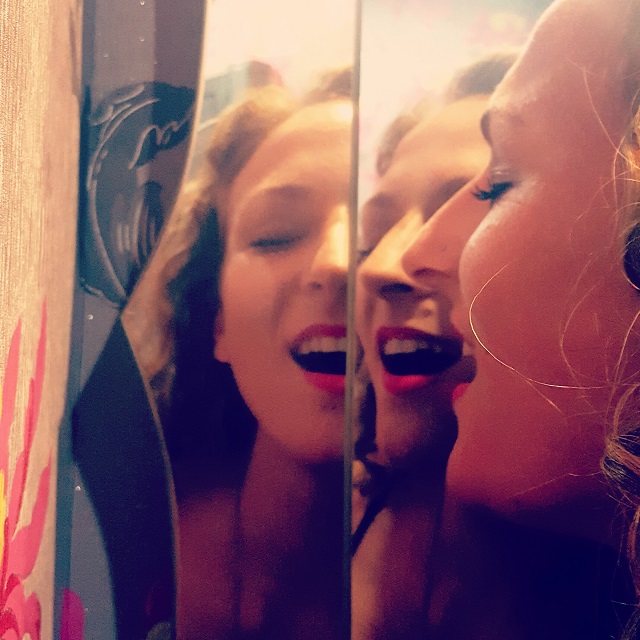
On election day, my coping mechanism was to buy a lot of sex toys.
A few freaks like me were privy to an Election Day promotion at Lion’s Den that gave a massive discount to customers for showing their voting stickers. I voted a week early, and had adhered my precious sticker to the inside of my phone case for safekeeping.
When the big day came, my queer-freak-weirdo friends and I all shopped together, and as the sun set, we settled into a cozy living room to watch the election results.
Let’s back up a bit: all day—before, during, and after the sex toy shopping bonanza—I was unable to catch a full breath. Do you ever feel like you have to yawn, all the time, but can’t quite get a satisfactory one? It feels kind of like what I imagine blue-balls feels like, but in your chest.
I was breathless, tense, and unceasingly tired. I didn’t know why until states were called and electoral college votes were assigned. My chest steadily tensed and my breath shortened.
It was as if my body knew before my mind did: we were in for it.
As we settled in the next day, my friends and I collectively gasped realizing that Donald Trump was the President-Elect of the United States. We cried. We embraced. We avoided eye contact for fear of coming to terms with the moment. We promised that we would always support one another. We exclaimed our undying love and commitment to our human and non-human family.
We simultaneously were alienated by the sense of impending doom and hopelessness, and inextricably bound to one another in our grief as we blew what we could muster of life-sustaining breath onto each other’s dying embers of hope.
Our crumbling postures pleaded: why, how? We braced ourselves.
Progressive America, not to mention the world, gasped at the prospect of our future, one formed by fear of the impacts and implications of the President-Elect’s hateful rhetoric. A shapeless danger-to-be, made all the more scary by the unpredictability of his campaign, and the election, had been introduced into our sense of reality. With this collective gasp, our breath was tense, quick.
I spent the next day convinced I was in The Twilight Zone. I felt eyes on me, like there were spies in the forest, enemies walking among us, fellow citizens that felt my bodily integrity as a woman, a queer, a polyamorous, unmarried, sex-positive being was not worth protecting.
Still, for the most part, I am not a body in danger on the street. I, for the most part, do not have to fear the police or be wary about how I carry myself. This is not to deny that I am vulnerable to violence, both as a human and as a woman, because I am. But I am white, I do not wear a hijab, and I “pass” as straight most of the time. I won’t likely be the target of random violence.
This is not true for all of our community. For some, the gasps come often, and rest close to the surface, easily provoked. For some, polite interactions with strangers is not a given. And this is the true and present danger posed by this election that we must all take responsibility for.
These gasps, compelled by fear and amplified through trauma, are meant to bring extra oxygen to the body in preparation for fight or flight. But there are other gasps.
Gasps of personal and collective delight and surprise.
Gasps brought into being by generous hands and soft lips.
Gasps of pleasure, gasps that open into possibility rather than close with fear.
Gasps that elongate into moans.
Gasps brought on by full immersion in one’s ecstatic joy in what might not look like mainstream rom-coms or capitalist success narratives.
Genuine gasps of discovery that bring us into the present moment and enliven our cells with sensory capacity.
Those gasps that allow our bodies to deeply, viscerally hold these moments with us and amplify our joy as living, interdependent, fluid, and emergent beings.
The day after the election, I taught two yoga classes, paying special attention to the breath. I felt in my cells how important and necessary this practice is—how radical it can be to slow down and attend to one’s breath, especially in the face of impulsive, reactionary hate and fear.
This simple but difficult practice can help us be responsive to, and responsible for, one another.
I sit here now, more than a week after the election, still struggling to catch a full breath. But I trust that with time, one will come, followed by many more. I am compelled by the belief that the most radical act I can do is continue to breathe fully and help my fellow freaks do the same.
We must resist the urge that comes with gasps of fear, the urge to close off and isolate ourselves. We must resist the urge to fight or fly.
Let us instead gasp with the ecstatic pleasure of connection.
Let us open to possibility as our breath elongates and deepens.
Let us continue to open our vulnerable bodies and hearts to one another and leave room for difference, for messy coalitions based on the complexities of love and community.
Let us be unrelenting in our search for ways to give ourselves and each other pleasure.
Author: Kelly Klein
Image: Author’s own.
Editor: Nicole Cameron


Read 0 comments and reply